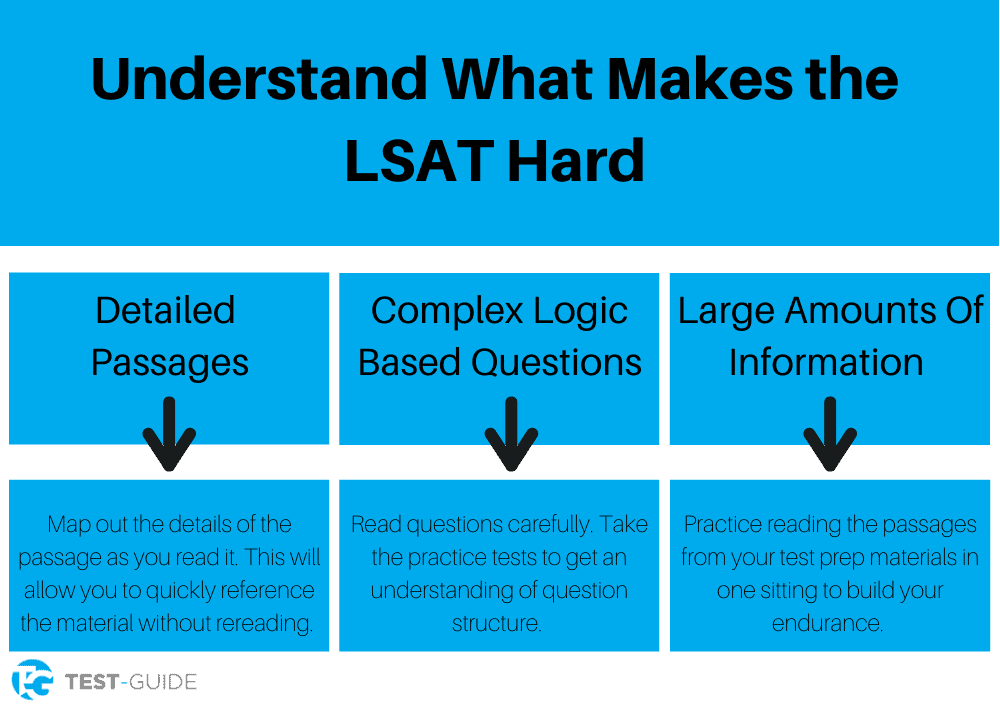Have you ever wondered how hard is the LSAT?
Short answer, the LSAT is a very challenging exam. We will discuss what makes the LSAT so difficult and what you can do to make it easier on yourself.
Is the LSAT Hard?
The LSAT is very difficult. The exam is unlike other standardized tests. You will not be answering cut and dry questions. You will need to think critically in order to answer the questions correctly.
You cannot just memorize concepts or certain types of questions when preparing for the LSAT. This exam will test your intelligence and make you use critical thinking across multiple concepts when solving a problem.
On top of all of that, there is also a time constraint. The exam lasts for a little under 3 hours and you will have 35 minutes per section. This is not a lot of time considering the types of questions you will be asked to solve.
Summary: The LSAT is very hard. The questions asked are not cut and dry and will require you to think critically. You can practice for the exam by taking our free LSAT practice test.
What Makes the LSAT So Hard?
There are a couple of factors that make the LSAT hard. 3 of the biggest factors include:
- Detailed Passages
- Complex Logic Based Questions
- Large Amounts of Information and Little Time
1. Detailed Passages
The LSAT is a passage-based exam. Each section contains various passages with multiple questions associated with the passage.
- Logical Reasoning: 4 passages with 5-8 questions per passage.
- Analytical Reasoning: 4 passages (logic games) with 5-8 questions per passage.
- Reading Comprehension: 4 total passages. 3 of them will be passages with one author, the fourth passage will be a combination of passages from different sources.
The passages you encounter on this exam can be cumbersome to read. The passages can become confusing very quickly.
2. Complex Logic Based Questions
The questions you encounter will not be cut and dry. You will need to use logic and reasoning to answer them correctly. There may appear to be multiple correct answers on the exam. You will need to select the “best” answer.
Some types of questions you may encounter that require you to think logically and critically include:
- Strengthen / Weaken Questions
- Flaw Questions
- Parallel Reasoning Questions
- Must be True Questions
- Assumption Questions
- Logical Force Questions
- Formal Logic Questions
It is important to keep track of your time when answering these questions. It is easy to spend too much time trying to answer difficult questions like these.
3. Large Amounts of Information and Little Time
There is a large amount of information to process for each passage and each specific question. In addition to the large amounts of information, there is little time to process everything.
You will have 35 minutes per section. This is very little time to read the passages, understand what the questions are asking, and think critically about how to answer each question.
LSAT Sections and What Makes Them Hard
There are 5 total sections on the LSAT:
- Logical Reasoning: 24-26 Questions, 35 Minutes
- Analytical Reasoning (Logic Games): 22-24 Questions, 35 Minutes
- Reading Comprehension: 26-28 Questions, 35 Minutes
- Variable Section (Unscored): 22-28 Questions, 35 Minutes
- Writing Sample (Unscored): 1 Essay, 35 Minutes
Learn more about the exam by reading our LSAT exam overview. Read below to find out what makes each section difficult.
Logical Reasoning
This section consists of short passages with questions that follow. You will be asked to determine an arguments strengths or weaknesses as well as what causes the argument to be strong or weak.
There are 24-26 total questions which will be multiple-choice. You will be given 35 minutes to complete the section. Logical reasoning is also referred to as the arguments section.
Some skills you may be asked to perform on this section include:
- Recognizing Various Parts of an Argument
- Drawing Conclusions
- Reasoning by Analogy
- Identifying and Applying Principles or Rules
- Identifying Flaws in Arguments
- Identifying Explanations
Some types of questions you may be asked include:
- Assumption Questions
- Strengthening/Weakening Questions
- Flaw Questions
- Inference Questions
You will not need specialized knowledge of certain logical terms but you will be asked to understand and critique the reasoning contained in different arguments.
You will need to understand various concepts like argument, premise, assumption, and conclusion. You will need to use critical thinking to locate flaws, clues, and misstatements in the questions and answer choices.
Tips for Making Logical Reasoning Easier
Here are some tips you can use to make this section easier:
- Work on Your Pace: You will have about 1 minute and 20 seconds per question. Practice your pacing before taking the actual exam. Be able to catch yourself when you spend too long on a certain question.
- Make Notes: You can make notes while taking the exam to help yourself. These notes could be related to a certain passage, a section within a passage, or specific questions. Just make sure your note-taking is quick and does not take up too much time.
- Find a Process and Get Comfortable with It: While preparing for the exam, find a process that works for you. An example would be reading the questions first and then the passage. Everyone is different, so find what works best for you.
You can use our LSAT practice test to prepare for this section.
Analytical Reasoning
This section is often referred to as the logic games section. You will be asked to use deductive reasoning to answer the questions in this section.
There are 22-24 multiple-choice questions in this section. These questions are split between 4 logic games. You will have 35 minutes to complete this section.
You may encounter the following types of logic games:
- Grouping Games
- Ordering Games
- Assignment Games
Some deductive reasoning skills that may be tested include:
- Reasoning with “if-then” Statements
- Figuring Out What Could or Must be True from Given Facts
- Recognizing When Two Statements are Logically Equivalent
Tips for Making Analytical Reasoning Easier
Here are some tips you can use to make this section easier:
- Read Passages Carefully: Make sure you are focused when reading these passages. The passages can be very complex and confusing. If you have to re-read a passage, you will lose valuable time. Make quick notes for each passage if needed.
- Do Not Make Assumptions: You should not make assumptions on this section. Everything you need to answer the question will be given in the passage.
- Only Use Information Given to You: This is related to the point above. Nothing will carry over from a previous passage and you will not need outside information to answer a question.
Reading Comprehension
This section includes 26-28 multiple choice questions. There will be 3-4 sets of questions for 1 passage and then 2 shorter passages. You will have 35 minutes to complete this section.
Some skills that may be tested include:
- Identifying the Main Idea and Details
- Drawing Inferences
- Making Extrapolations
- Identifying Structure of a Passage
- Analyze Use of Language
The passages in this section can include a wide range of subjects. It is important to note that you do not need any prior knowledge to answer these passage questions correctly – you will just be asked to analyze the passages.
Tips for Making Reading Comprehension Easier
Here are some tips you can use to make this section easier:
- Summarize Passages: You can make notes for each passage as you read through it (or at the end). This could include summarizing main ideas, arguments, or key details.
- Make a Mental Map of the Passage: Try to remember where key details, words, or ideas appeared in the passage. This will help you quickly locate the portion of the passage if you want to return to it while answering a question.
Writing Sample
This section is not scored, but it is sent to law schools and may be used in their admissions process. While this section is not scored, it can help you get into the law school of your choice.
This writing sample is your chance to showcase your writing and argument skills and could be the difference between influencing a law school admissions counselor or not.
Tips for Making the Writing Sample Easier
Here are some tips you can use to make this section easier:
- Make a Choice: You will be prompted to make a choice. Make a choice and stick with it throughout the essay.
- Give Supporting Evidence: Whatever your choice is, make sure you give supporting evidence throughout the essay.
- Have a Plan: When thinking about your choice, it can be helpful to create a brief outline with some key points. This outline will help you formulate your essay. You can review everything afterwards.
You can practice for this section by writing essays and having someone familiar with the LSAT take a look at them.
How Hard is it to Pass the LSAT?
Technically, there is not a passing score for the LSAT. However, the higher you score on the exam, the better your chances are of getting into law school.
Listed below are some percentiles for the LSAT. You will want to score at least in the 50th percentile (probably higher).
- 180 = 99th
- 170 = 97th
- 160 = 80th
- 150 = 44th
- 140 = 13th
- 130 = 2nd
For more information, read our guide on good LSAT scores.


